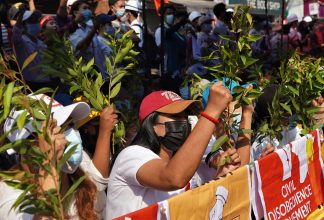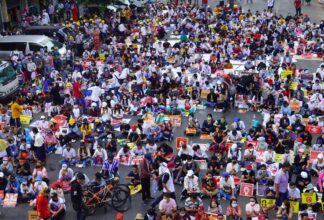500 Days Since the Military Coup in Burma

On 1 February 2021, the military seized power over Burma by overturning the election results and detaining State Counsellor Aung San Suu Kyi. The military is still controlling power by force and uses brutal violence against human rights defenders, civil society groups, and journalists in order to silence all forms of protest and dissent. More than 1,900 people have been killed by the military and over 14,000 people have been arrested.
During the November 2020 elections in Burma, the National League for Democracy led by Aung San Suu Kyi, won a landslide victory. This triggered a reaction from the military, who claimed that there had been widespread election fraud. This claim, however, was turned down by the election commission. On 1 February, as the parliament was scheduled to hold its first session since the elections, the military launched a coup and took control over the country.
The coup prompted mass protests and more than 1,900 people have been killed by the military. Over 14,000 people have been arrested in the harsh crackdowns. In a series of charges, Aung San Suu Kyi has been sentenced to several years in prison.
Reports of war crimes
According to a recent report by Amnesty International, the post-military assaults in the Eastern states Kayin and Kayah include war crimes and likely crimes against humanity. The violence in the Eastern states has escalated since the military coup, killing hundreds of civilians and displacing more than 150,000 people.
Another report launched by Kachin’s Women’s Association Thailand maps out war crimes committed by the military junta in Northern Burma, in the Kachin State and the northern Shan State, during the past six months. The report reveals a new and deadly trend of airstrikes over populated villages in Kachin state, in apparent retaliation for conflict losses along strategic transport routes. Between November 2021 and April 2022, they report that 21 civilians have been killed in the Northern states, through airstrikes on civilian areas, artillery attacks on civilian areas, and indiscriminate shooting of civilians. They also report that dozens of villagers, including women, have been forced to walk between military troops as human shields and that ongoing fighting and abuses have caused new displacement of over 5,700 villagers across northern Burma during the past six months.
During the last decades, ethnic armed organisations in Burma have fought for their rights and greater autonomy. Ceasefires have broken down since the military coup and new armed groups have emerged. Some of the military’s recent attacks appear to have directly targeted civilians as a form of collective punishment against people accused of supporting an armed group or the wider post-coup uprising.
What we do
Civil Rights Defenders continues to monitor the situation in the country. This is being done in close cooperation with Burmese partner organisations.
We are also working with partners in advocacy, to let the international community know what is happening in Burma, and to support the efforts to reinstate democracy.
Civil Rights Defenders has been providing flexible and emergency funds to human rights defenders and activists that improve their security. Since the coup, a total of 697 Burmese activists and human rights defenders have received support from Civil Rights Defenders emergency fund. In Burma, most of the support has been to provide safe accommodation for human rights defenders. We have also offered secured office spaces and communication tools for human rights defenders on the ground. The need for assistance is extensive.

